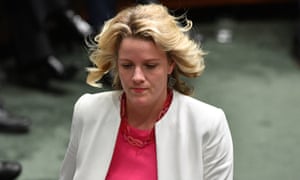ALP says there were ‘allegations’ that the banking royal commission’s report was leaked before being tabled
Labor has asked for an investigation into whether ministers, advisers
or officials leaked sensitive information about the banking royal
commission’s final report before it was released, pointing to
sharemarket activity late on Monday morning when bank stocks surged.
The opposition spokeswoman on financial services, Clare O’Neil, has written to the secretary of the prime minister’s department requesting a probe be launched, saying there were “concerning allegations” that the Hayne report was leaked before it was tabled in parliament late on Monday afternoon.
The sharemarket activity on Monday morning was the prelude to a significant rally in major bank stocks on Tuesday
after financial markets opened. Banks were up between 3.9% and 7.4% in
the day’s trade, which suggested the financial services sector, analysts
and investors feared the Hayne report would be much more radical.The opposition spokeswoman on financial services, Clare O’Neil, has written to the secretary of the prime minister’s department requesting a probe be launched, saying there were “concerning allegations” that the Hayne report was leaked before it was tabled in parliament late on Monday afternoon.
The Morrison government declined to comment on Labor’s push on Wednesday evening, but earlier this week the treasurer, Josh Frydenberg, denied that any market participants were given advance notice of the recommendations and the government’s response.
Guardian Australia revealed on Wednesday that talks were under way between Labor and the crossbench that could result in the parliamentary schedule being extended. Bob Katter will be critical to whether the numbers are there to force the change.
Katter told Guardian Australia late on Wednesday there “may be some merit” to extra sitting weeks of parliament to consider banking reforms and he would “seriously consider” it.
Katter complained the former prime minister, Malcolm Turnbull, had “gazumped the crossbench by putting in a toothless tiger” in setting up a banking royal commission on the government’s terms and wants to see more scrutiny on bank bosses than “little blokes selling mortgages”.
“But the prime minister [Scott Morrison] may threaten to go to the people and dump on us [at an early election] … There’s going to be a lot of brinksmanship here. We’ll see who blinks first,” he said.
The Coalition no longer commands a majority in either chamber and has been keen to avoid scheduling sitting weeks before going to the polls in May to try to avoid losing substantive or procedural votes, and the appearance of not being able to command the daily agenda.
With parliament set to resume next week, Morrison is attempting to project a disposition that the government would be unconcerned about losing a vote on legislation initiated by the independent Kerry Phelps.
Morrison has declared he will “simply ignore” losing a substantive vote on legislation, branding the Phelps medical evacuation bill “stupid”.
To try to peel independents away from the crossbench proposal, Morrison pledged this week to set up an independent medical review panel to vet medical transfers of asylum seekers from offshore detention.
He has also upped the political ante with Labor, declaring if the opposition supports the crossbench proposal Australia will lose control of its borders.
Labor has rejected those arguments, but it is clear it is also on the move. Its leader, Bill Shorten, has signalled twice this week that the ALP might support the government’s proposal on medical transfers, rather than the crossbench bill.
Shorten said the government was lining up a U-turn to avoid a defeat in parliament, “but I’m not going to be a purist. If they get to an acceptable outcome I’m not going to judge their motivation”.
“Labor said that we want to make sure that independent medical advice is taken more seriously. We will have a look at what the government’s proposing.
“The way they normally communicate with me is either through the media or angry threatening letters. But despite that I will not be deterred. We will see if it works, we’ll then have a look at it, but at this stage we’re still supporting the Phelps amendments.”
The crossbench proposal will only succeed it Labor supports it.
Phelps told Guardian Australia the government was “showing signs of desperation and exasperation because it’s trying to find a way to avoid a vote” on the medical transfer bill.
“The best way to avoid losing a vote is to vote with it, but the government is so resistant to compassionate treatment of asylum seekers it can’t see the wood for the trees,” she said.
Phelps said the government could have backed her bill which she said was supported by the parliament, the Australian community, lawyers and doctors who want to break the deadlock, but had “chosen to politicise” medical transfers with its demands Labor and the crossbench abandon the bill.
“Any dilution of this bill will make it a lot less effective.”
Her bill allowed only for temporary transfer of people for medical care, not for residency or the right to settle, because that is “not the policy of either major party”.
“I don’t think the Australian people will take kindly to government playing politics with people’s lives,” she said. “This is a medical solution to a medical problem with strong support.”

No comments:
Post a Comment